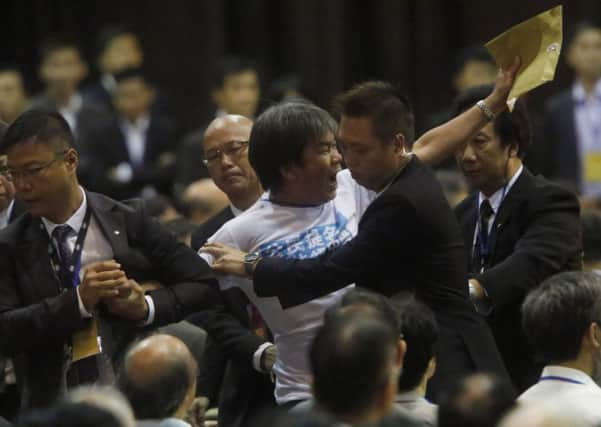Activists confront Beijing official in Hong Kong


They chanted slogans and held up placards accusing China’s central government of “breaking its promise” to let Hong Kong directly elect its leader. Some stood on chairs and pumped their fists, waving signs that read “Shameful” and “Loss of faith”.
The noisy demonstration at the start of the speech by Li Fei, a deputy secretary general of the standing committee of the National People’s Congress, was a rare show of open defiance toward a Beijing official.
Advertisement
Hide AdAdvertisement
Hide AdMr Li continued his speech after security officers had hustled the protesters out of the chamber, to applause from audience members, including other lawmakers, councillors from pro-establishment parties and business leaders.
Police used pepper spray on members of a radical activist group attempting to storm barricades and enter the venue.
On Sunday, Beijing inflamed tensions by ruling out open nominations of candidates running for Hong Kong’s top job in inaugural elections in 2017.
The expected announcement sets the stage for escalating confrontations between China’s central government and democracy supporters in Hong Kong who have pledged to carry out a civil disobedience campaign that could culminate in a mass protest to cripple the city’s financial district.
Beijing had pledged to allow voters, rather than an elite committee of mostly pro-Beijing tycoons, to elect Hong Kong’s leader in 2017. But it wants to limit candidates to two or three who must be approved by a nominating body similar to that elite committee, raising fears candidates will be screened for loyalty to Beijing.
Beijing’s hard line reflects president Xi Jinping’s ongoing crackdown on mainland dissent to remove all challenges to the Communist Party, as well as Hong Kong’s waning importance to China, as economic reforms boost other mainland financial hubs such as Shanghai.
China has sought to blame the opposition in Hong Kong on interference by the UK and other unidentified foreign powers, in an echo of Beijing’s frequent attacks on “overseas anti-China forces”, which it blames for encouraging dissidents and fuelling instability among its ethnic minorities.
It also accused Hong Kong’s opposition of having become radicalised and refusing to compromise.
Advertisement
Hide AdAdvertisement
Hide Ad“No matter what the opposition does, the central government won’t budge from its stance, because it cannot allow the reins of power in Hong Kong to shift to the opposition,” an editorial in the China Daily said yesterday.
Hong Kong’s democracy supporters come from a broad cross-section of society, including students, religious leaders, financial workers and lawmakers. The “Occupy Central” group’s leaders include two university professors and a clergyman.
Hong Kong activists operate openly in a way unthinkable on mainland China. Beijing exercises a broad range of punitive measures against dissidents, ranging from lengthy jail sentences to constant harassment and extra-judicial house arrest.
Political gatherings are routinely broken up, even in private homes, and protests allowed only when they align with Beijing’s agenda, such as criticising Japan or the United States.
China also polices the internet for political discussions, blocks Facebook and Twitter, and demands that their Chinese equivalents report and remove any sensitive content.
Through such methods, Beijing keeps its critics fearful, impoverished and disorganised. Mainland dissidents are frequently charged with subversion, but also face what many consider trumped-up charges of disrupting social order, tax evasion or even organising a crowd to block traffic.
Such restrictions are largely absent in Hong Kong. Activists are free to organise large anti-government protest rallies attracting tens of thousands of demonstrators, thanks to guarantees in the city’s mini-constitution ensuring freedom of speech.
In addition, people in Hong Kong do not face politically motivated punishment from the city’s independent courts. More than 500 protesters arrested in July for staging an unauthorised sit-in following a big pro-democracy rally were charged with unlawful assembly and obstructing police, but most were later released.